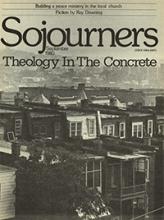In recent years, the initial stages of what could become a strong and vibrant peace movement has emerged within the churches of this country. This newfound attachment to peace is due to the convergence of a renewal of faith and an awakened perception of the unprecedented danger of nuclear war.
In a time when the nations are courting political and military disaster, there are signs of hope in the church. With increasing frequency, the call to peace is being heard from pulpits, seminary classrooms, and Christian publications. In many places, Christians are reaching a critical turning point. They see the nuclear threat as having everything to do with their faith in Jesus Christ.
As with any fresh and untested conviction that is spreading in the lives of Christians, the peace concern requires discernment, direction, and leadership. The churches need to construct an appropriate focus and method to incarnate the peace of Christ. Most importantly, the emerging peace mission requires committed people who will pursue it in costly ways.
Strong and active peace and justice organizations are already available to Christians. The Fellowship of Reconciliation, with a large membership and many local chapters, is deeply rooted in the religious pacifist tradition. In recent years, Pax Christi--for Roman Catholics--and New Call to Peacemaking--for the historic peace churches--are involving growing numbers of people. The Atlantic and Pacific Life Communities network has long offered persistent resistance to the arms race. World Peacemakers, an outgrowth of Washington's Church of the Saviour, gives important help in starting and maintaining peace groups both within and across congregational lines. Many denominations have "peace fellowships."
Read the Full Article

